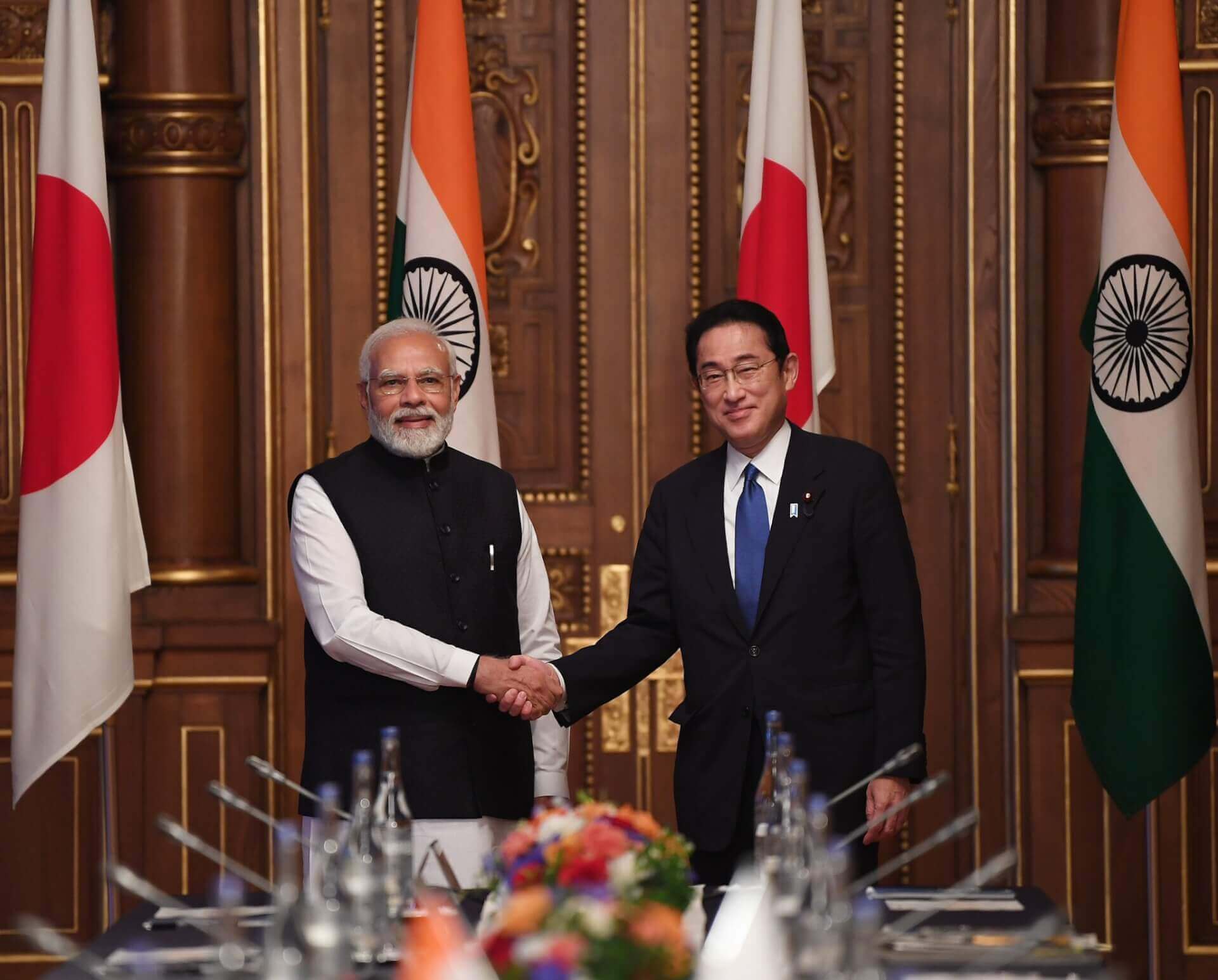Indian Prime Minister (PM) Narendra Modi and his Japanese counterpart Fumio Kishida held a bilateral meeting on the sidelines of the Quad Leaders’ Summit in Tokyo yesterday, wherein they jointly reiterated their commitment to creating a free, open and inclusive Indo-Pacific region.
They outlined a vision to strengthen security and defence exchanges and expand cooperation in the field of defence manufacturing. Furthermore, they agreed to hold the next 2+2 meeting between their foreign and defence ministers in Japan in the near future.
PM Kishida @kishida230 had a bilateral summit meeting with PM Modi @narendramodi in Tokyo today. https://t.co/MkQK9e3TSB
— Noriyuki SHIKATA (四方敬之) (@norishikata) May 24, 2022
Apart from diplomatic and defence ties, the pair also touched on economic relations. A press release issued by the Indian prime minister’s office said there are plans in place to increase Japanese public and private investment in India to over $39 billion over the next five years.
Modi touted the removal of red tape to show how India is incentivising foreign investment, pointing to the Gati Shakti initiative. In this regard, Modi welcomed the fact that 24 Japanese companies have already applied for Production Linked Incentives (PLIs) schemes in India.
They also spoke about infrastructural development, celebrating the progress made in the Mumbai-Ahmedabad Speed Rail project. Furthermore, they discussed collaboration in ‘critical and emerging technologies’ like 5G, Beyond 5G, and semiconductors.
I had excellent discussions with the business leaders of Japan, and an engaging interaction with the vibrant Indian community in Japan. I thank the Government and the people of Japan for the warm hospitality.
— Narendra Modi (@narendramodi) May 24, 2022
They also sought to integrate climate action policies with these initiatives. To this end, New Delhi and Tokyo agreed to expand collaboration in the clean energy sector, including green hydrogen.
Furthermore, they talked about relaxing travel restrictions, with Modi requesting quarantine-free entry into Japan for Indian travellers with Covaxin and Covishiled vaccine certificates.
PM Kishida: I invited President Biden of the United States, Prime Minister Modi of India, and Prime Minister Albanese of Australia to Tokyo, where we held the #Quad Leaders' Meeting, with myself as Chair. (1/2) pic.twitter.com/X2Bs4qIfSi
— PM's Office of Japan (@JPN_PMO) May 25, 2022
Modi also met with Kishida’s predecessor, Yoshihide Suga, and discussed expanding strategic ties on a bilateral and a global scale. The Indian PM invited Suga to visit India along with a wider delegation of Japanese MPs to realise this vision.
In fact, the Indian leader met with two other former Japanese PMs during his two-day visit—Yoshiro Mori and Shinzo Abe. Abe is set to shortly take over Mori’s incumbent position as the Chairperson of the Japan-India Association (JIA). Established in 1903, the JIA is one of the oldest friendship associations in Japan and promotes political, economic, and cultural linkages between the two countries.
Prime Minister Modi @narendramodi, it was truly a pleasure to welcome you to Japan this week after you received me so warmly in India in March.
— 岸田文雄 (@kishida230) May 24, 2022
Together, you and I succeeded in moving Japan-India relations another step forward. Thank you, Prime Minister Modi. https://t.co/NbtLWoYeh9
Had an excellent meeting with PM @kishida230. This meeting gave us the opportunity to review the full range of relations between India and Japan. Our cooperation is rapidly rising and this augurs well for the people of our nations. pic.twitter.com/yLjMAuTimG
— Narendra Modi (@narendramodi) May 24, 2022
In addition, Modi chaired a Business Roundtable with the executives and CEOs of 34 Japanese companies on Monday, with representatives from the automobile, electronics, semiconductor, steel, technology, and banking and finance sectors. There were also officials from the business and trade organisations such as Keidanren, the Japan External Trade Organization (JETRO), the Japan International Cooperation Agency (JICA), the Japan Bank for International Cooperation (JBIC), the Japan-India Business Consultative Committee(JIBCC), and Invest India.
Modi used the event to tout the India-Japan Industrial Competitiveness Partnership and the Clean Energy Partnership and also spoke about PLIs and the National Infrastructure Pipeline (NIP). Like in his meeting with Kishida, the PM advertised India as a new and emerging destination for foreign investment, pointing out that India received $84 billion in foreign direct investment last year.
In this regard, Modi held separate meetings with executives from Softbank Corporation, Suzuki Motor Corporation, NEC Corporation, and Fast Retailing Co Ltd.
India readout of PM Modi & Japan PM Kishida meet. Bullet train project discussed. pic.twitter.com/n7KEqvLHhm
— Sidhant Sibal (@sidhant) May 24, 2022
Furthermore, Modi addressed and interacted with over 700 members of the Indian diaspora and Japanese ‘Indologists.’ It is estimated that there are over 40,000 Indian diaspora in Japan.
In addition, on Monday, he wrote an op-ed for a local Japanese media outlet Yomiuri Shimbun, wherein hailed the two countries’ “partnership for peace, stability and prosperity” and their shared commitment to achieving a “rules-based international order.” He further described Japan as an “irreplaceable ally.”

